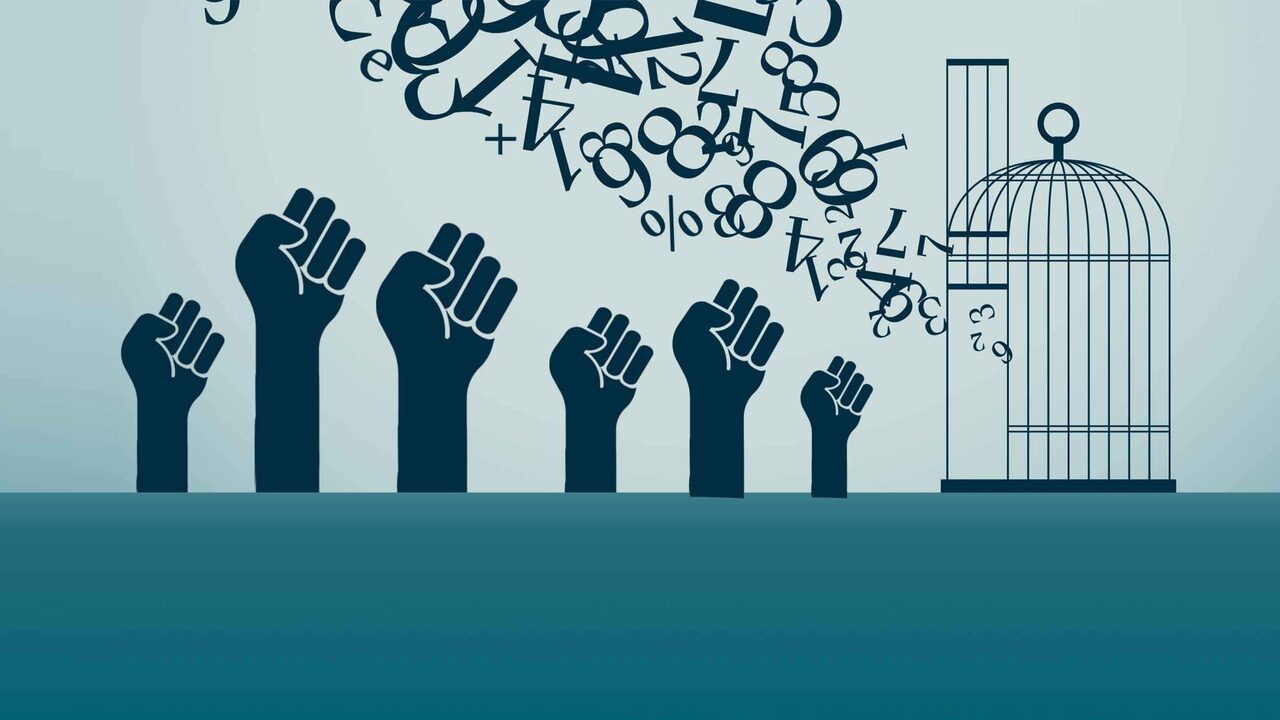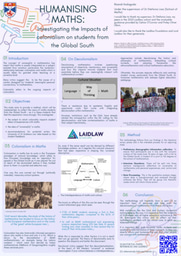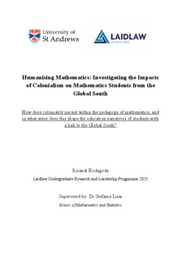Contextualising Mathematics: The Impacts of Colonialism on Mathematics students from the Global South

The legacy of colonialism is an issue extensively explored in today’s society- from the subjective power of post-colonial literature to the action of higher education institutions in exploring ways in which they have been impacted by imperialism- notably an effort that the University of St Andrews itself has contributed to recently.
Having a background in English Literature, it is quite easy to follow the works of post-colonial writers and track the ways in which they reclaim power and identity through the subjective portrayal of subaltern (or colonised) bodies of people. But while this profound introspection is often explored qualitatively, recent scholarship and urges from external bodies such as the UK’s Quality Assurance Agency for universities (QAA)[1] have pushed these ideas into the pedagogy and curriculum of mathematics. As a language hailed for its universality, the impacts of colonialism on maths- and the consequent case to decolonise it- is one that is much harder to grasp. Yet its importance is evidenced by the fact that 17.3% of BAME students in the UK receive a first in their degree, compared to 36.1% of white students. [2]
Historically, the erosion of cultural perception within mathematics- as a cause of the hegemonic epistemology spread by colonialism- has severely impacted the ways in which it is communicated. From the way the Global mathematics curriculums are in a ‘European style’ to the ways in which maths is such that we follow the works of ‘the “great” white European men,’ [3] the legacy of this influence remains embedded in higher education today. This is potentially sustained under the illusion that Eurocentric knowledge is universal. [4]
Decolonial theory can be used here to challenge colonial structures and contribute to a shift - from a culture of exclusion- to one with space for other knowledge systems. It is, to my current understanding, not so much an outcome but more of a process in interrogating epistemological systems in mathematics and why we can take them for granted today- given their historical development through colonialism. In the same way that writers reclaim power through the subjective voice, decolonial theory in maths originated in the Global South to ‘narrowly skew perspective on the history of mathematics’[5]. This involves listening and responding to the mathematicians impacted by it, to help mitigate the current lapse in mathematical education.
5200.jpg)
A March 2016 protest at the University of Oxford calling for the removal of a Statue of Cecil Rhodes and for the decolonisation of Education. (Image Credits to David Hartley/REX/Shutterstock.)
Institutions in the Global South have led international efforts to decolonise mathematics at a higher education level, and it is no surprise as the role of colonialism in maths is one that impacts students from these areas more profoundly. The purpose of my research is to investigate the effect of these impacts on mathematics students from the Global South here at the University of St Andrews. In the coming six weeks I intend to interview some of these students and listen to their experiences and perceptions of the way that colonialism has impacted their education. My aim is to utilise their perspectives and (evaluated) elements of decolonial theory to identify what can be bettered within our institution to mitigate these impacts. By listening to and prioritising these views I hope to generate awareness about the legacy of coloniality in higher education to help form a more equitable and inclusive space for mathematics at the University of St Andrews.
[1]- QAA, (2023, March 8), Subject Benchmark Statement: Mathematics Statistics and Operational Research:
[2]- Gov.UK, (2023, December 6), Undergraduate Degree Results:
[3]- University of Oxford Mathematical Institute (2023, April 3), A World History of Mathematics:
https://www.maths.ox.ac.uk/about-us/history/world-history-mathematics
[4]- Le Grange, (2019, October 25), The Curriculum Case for Decolonisation. pp. 29-47 in Jansen, Decolonisation in Universities: the politics of knowledge
[5]- The Times Higher Education, (2022, November 7), Professors say decolonisation agenda ‘politicising’ maths degrees:
*Banner photo courtesy of Undark Magazine and DigitalVision Vectors via Getty


Please sign in
If you are a registered user on Laidlaw Scholars Network, please sign in
Great first blog, Risandi! Keep up the good work, and I will be interested to see what your research uncovers this summer.